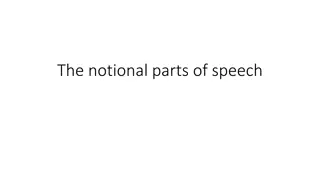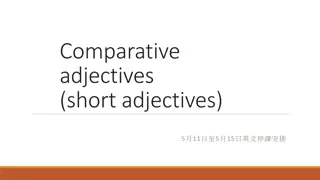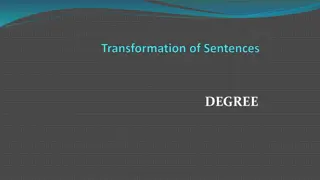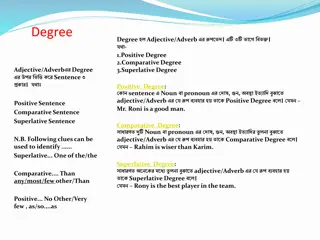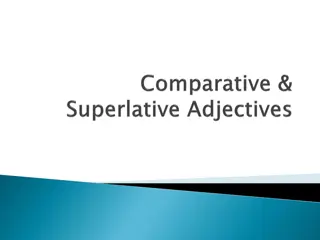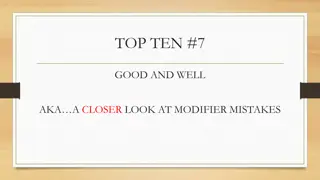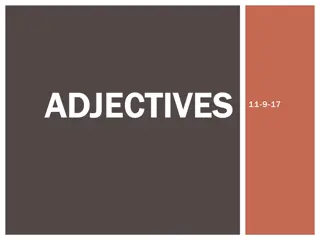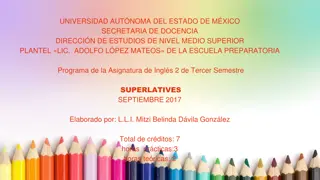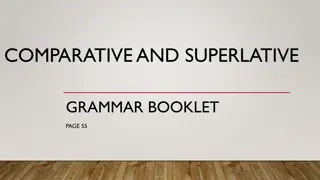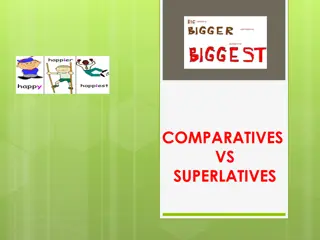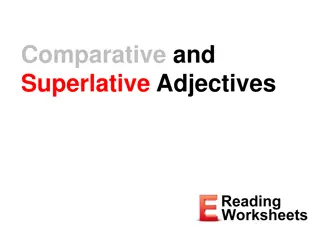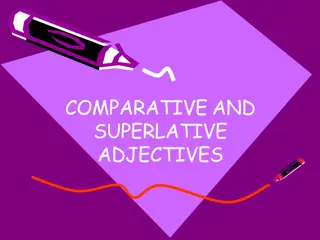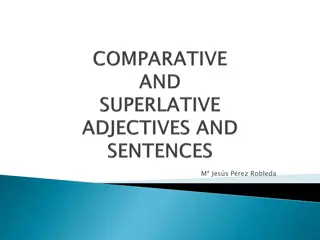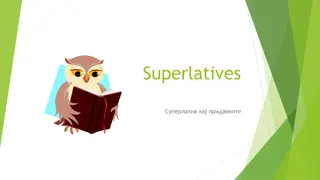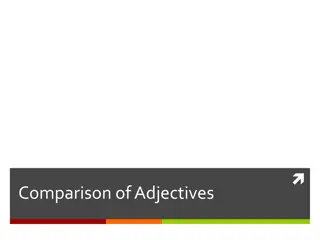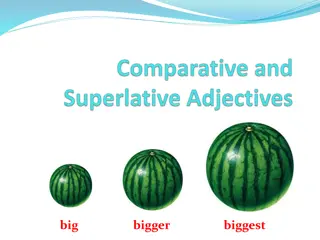Understanding Comparative and Superlative Forms of Adjectives
Explore how adjectives with one, two, or more than two syllables form their comparative and superlative forms. Learn about common spelling rules and exceptions for creating comparisons. Discover when to use 'er'/'est', 'more', or 'most' for different types of adjectives.
Download Presentation

Please find below an Image/Link to download the presentation.
The content on the website is provided AS IS for your information and personal use only. It may not be sold, licensed, or shared on other websites without obtaining consent from the author. Download presentation by click this link. If you encounter any issues during the download, it is possible that the publisher has removed the file from their server.
E N D
Presentation Transcript
12A World records Logo www.comany.com 1
Adjectives with one syllable Usually if an adjective has only one syllable, we add 'er' to make the comparative form. We add 'est' to make the superlative form.clean cleaner / cleanest cold colder / coldest small smaller / smallest young younger / youngest tall taller / tallest Logo www.comany.com 2
There are some spelling changes. If there is one vowel followed by one consonant at the end of the adjective, we often double the consonant.wet wetter / wettest big bigger / biggest hot hotter / hottest thin thinner / thinnest If the adjective ends in 'y', this often changes to 'i'.dry drier / driest If the adjective ends in 'e', we don't add another 'e', just 'r'.nice nicer / nicest large larger / largest Logo www.comany.com 3
There are a few adjectives that we have to use 'more' or 'most' with, even though they only have one syllable. We CAN'T add 'er' or 'est'.fun more fun / most fun (NOT funner / funnest) real more real / most real (NOT realer / realest) right more right / most right (NOT righter / rightest) wrong more wrong / most wrong (NOT wronger / wrongest) Logo www.comany.com 4
Adjectives with two syllables For adjectives with two syllables we generally use 'more' or 'most careful more careful / most careful bored more bored / most bored But some two syllable adjectives can take 'er' or 'est'. It's also fine to use 'more' (for the comparative) or 'most' (for the superlative).clever cleverer / cleverest simple simpler / simplest narrow narrower / narrowest quiet quieter / quietest Logo www.comany.com 5
Adjectives with two syllables that end in 'y' usually can add 'er' or 'est' (y generally changes to i). It's also fine to use 'more' or 'most'.dirty dirtier / dirtiest pretty prettier / prettiest happy happier / happiest ugly uglier / ugliest Logo www.comany.com 6
Adjectives with more than two syllables Adjectives with more than two syllables can only make their comparative by using 'more' and their superlative by using 'most beautiful more beautiful / most beautiful intelligent more intelligent / most intelligent interesting more interesting / most interesting expensive more expensive / most expensive Logo www.comany.com 7
Irregular adjectives There are also some irregular adjectives. We just need to learn these forms good better best bad worse worst far further furthest little less least much more most Logo www.comany.com 8
Present Perfect To talk about experiences in life until now, we don t say when they happened. Present Simple We use it if we say when something happened Examples I ve been I ve been to India. I went ago. went there two years Logo www.comany.com 9
To make the positive present perfect tense, use:'have participle participle 'have' / 'has' ' / 'has' + the past past Positive Positive Short Form I have played I've played you have worked you've worked he has written he's written she has walked she's walked it has rained it's rained we have travelled we've travelled they have studied they've studied Logo www.comany.com 10
Negative Negative Short Form I have not eaten breakfast today I haven't eaten you have not been to Asia you haven't been he has not seen the new film he hasn't seen she has not played tennis she hasn't played it has not snowed this winter it hasn't snowed we have not slept all night we haven't slept they have not tried the food they haven't tried Logo www.comany.com 11
To make a question, put 'have' or 'has' in front of the subject: 'Wh' Questions 'Yes / No' Questions Where have I left my umbrella? Have I missed the bus? What have you done today? Have you visited London? Why has he gone already? Has he worked as a waiter before? Where has she been in the UK? Has she met John? Why has it rained so much this summer? Has it been cold this week? What have we done? Have we arrived too early? Where have they learned English before? Have they studied English grammar before? Logo www.comany.com 12
Logo www.comany.com 13
Logo www.comany.com 14
Logo www.comany.com 15
Logo www.comany.com 16
Logo www.comany.com 17
Uraditi 12 Review, strana 100 Logo www.comany.com 18
Complete the worksheet using the correct comparative or superlative. 1) Canada is __________ than China but Russia is the ____________ country. a) big b) bigger c) biggest 2) Monkeys are ____________ but ants are ____________. a) small b) smaller c) smallest 3) Giraffes are the __________ land animal. a) tall b) taller c) tallest 4) Boys usually have ___________ hair than girls. a) short) shorter c) shortest 5) Lamps are ___________ but the sun is ____________. a) bright b) brighter c) brightest . Logo www.comany.com 19
Comparative Superlative Comparative Superlative Expensive Beautiful Deep Fat Modern Silly Noisy Amazing Busy Famous Simple Funny Important Short Crazy Nervous Spicy Handsome Early Nice Generous Ugly Popular Hot Difficult Young Slim Interesting Sad Bad Easy Strong Cold Pretty Intelligent Good Quiet Narrow Old Far Tall High Cheap Dangerous Logo www.comany.com 20
THANK YOU THANK YOU Logo www.comany.com 21


